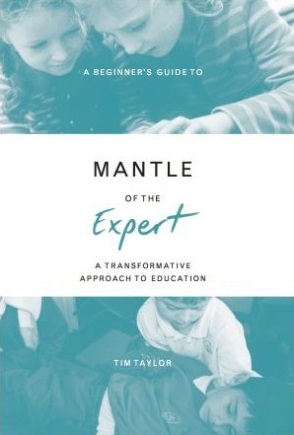A Beginner’s Guide to Mantle of the Expert is an intriguing pedagogy with the potential to transform primary education and children’s experience of learning. I caught up with the author, Tim Taylor.

Tim: Mantle of the Expert is an approach to teaching and learning that was developed by Dorothy Heathcote while she was a lecturer at Newcastle University.
Heathcote’s passion was to make learning meaningful and engaging to children, and in the 1970s and ‘80s, she developed a whole series of methods using drama conventions from the world of theatre. These methods became very popular among drama teachers but were less well used by teachers in other areas of the curriculum.
This was a source of frustration for Heathcote, who was convinced her methods could be applied much more widely. In response, she developed an approach that incorporated the essence of her work but could be used by teachers without a background in drama.
This approach she called Mantle of the Expert.
Tim: I was introduced to Mantle of the Expert in the early ‘90s by one of Heathcote’s students, Luke Abbott. Luke visited the school I was working in as an NQT and took my class.
I thought what he did was amazing, casting my class of difficult to engage Year 2s as a rescue team who were freeing villagers trapped in a giant hole. Working with them to create the story, Abbott weaved in wide areas of the curriculum and had my class completely enthralled.
I loved it and wanted to find out how I could teach like that.
Tim: It is! Unfortunately, back then there was very little material on Mantle of the Expert and the only book (written by Heathcote and Gavin Bolton) was far too advanced for a beginner like me.
I had no choice but to learn it the hard way, by watching Abbott whenever I could and practicing in my own classroom. This was a slow process, but eventually, things started to make sense and my understanding of the approach improved.
Tim: In 2005 my school was visited by Ofsted, they were impressed with what they saw and recommended my work to the Innovations Unit. This kick-started a long collaboration with Luke and the creation of a set of resources and plans that became www.mantleoftheexpert.com and eventually my book, The Beginner’s Guide to Mantle of the Expert.
Tim: The great benefits of Mantle of the Expert are that it helps to make learning meaningful, purposeful, and engaging.
The students are cast within a fictional context as an expert team with responsibilities and the power to make decisions. They work for a client who sets standards and commissions them to perform specific tasks. These tasks are planned by the teacher to develop learning objectives from across the curriculum.
In this way (as the rescue team, for example) the students are required to draw maps, make plans, create equipment lists, follow instructions, and write up reports. All areas of learning the teacher wants students to develop but done for reasons they accept as important and urgent.
Tim: It is not a trick, they understand it is all fiction, but they are willing to invest their time, commitment, and energy because they find the activities enjoyable and exciting.
Tim: I see Mantle of the Expert as one of a range of teaching approaches teachers can use as and when necessary.
It doesn’t work for everything and it is important to choose the right method for the learning you want to develop (including discrete instruction), but for those who are interested in engaging students and who want to make learning something exciting and purposeful, Mantle of the Expert is a fantastic approach.
Tim: Teaching is something that develops through training, practice, and reflection. This all takes time and effort, so we need to look closely at how long we give to improving our pedagogical knowledge, skills, and understanding.
When I think back at all the courses I’ve done over twenty years, the ones that made a difference were those that built on work already done and required me to think about my practice, make changes, and reflect on the results.
One day training courses rarely do this, because there isn’t time to genuinely embed ideas. We know this from our own work with students, so why do we expect ourselves to be any different?
If I was to give advice on professional developed it would be to invest in long-term projects that aim to make changes over a year or two, not those that promise quick fixes or easy solutions.
Download the CPD leadership toolkit to get advice on high-quality professional development activities, evaluating the impact of CPD and how to develop a coaching culture.
Tim: I believe teaching is a practical business for most teachers who don’t really worry about the ideological punch-ups we occasionally see on EdTwitter and blogging.
Education for them is not a battleground, but a stage, with different actors, playing different roles, and with different things to say. Some of these things they will like and might adopt in their own classrooms, while others they don’t like and will ignore.
The traditionalist versus progressive debate can be very interesting and sometimes generates a productive tension, but I don’t think it is wise to adopt a single approach to education from either ideology.
Both have strengths and both have weaknesses, so pick and mix those parts that work best for your students and ignore the rest.
Read What we’re missing when we talk about teaching for more on the progressive versus traditional debate and how teachers actually teach.
Tim’s book is called A Beginner’s Guide to Mantle of the Expert. You can find out more at: beginnersguidetomantleoftheexpert.co.uk.